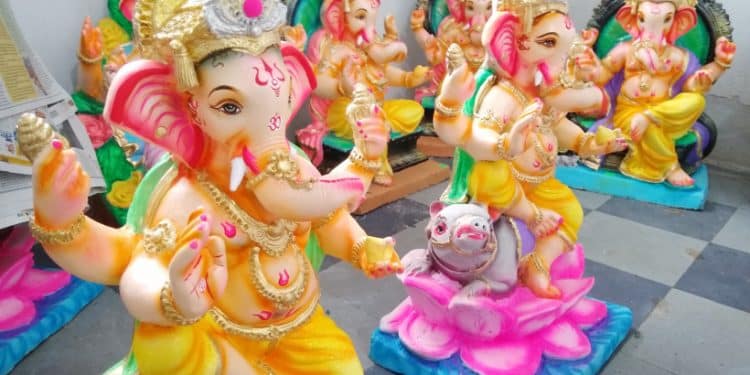
Spirituality
How Many Years Can We Keep Ganpati at Home
Ganesh Chaturthi is a festival that has been celebrated for centuries. It honors Lord Ganesha, who is known as the remover of obstacles and the god of beginnings. This festival started during the reign of the Maratha ruler, Shivaji Maharaj, and later gained popularity during the Indian freedom struggle when Lokmanya Tilak promoted it to unite people.
The Tradition of Bringing Ganpati Home: During Ganesh Chaturthi, many families bring Ganpati idols into their homes. This practice symbolizes inviting Lord Ganesha to stay with them, bless their homes, and remove any obstacles in their lives. The idols are worshiped with devotion and love for a period, usually ranging from one and a half days to eleven days, before being immersed in water, symbolizing Ganesha’s return to his heavenly abode.
When Ganpati arrives in your home, he is more than just a deity; he is like an honored guest who becomes a part of the family. His presence fills the home with joy, love, and positivity. Just as you would eagerly await the visit of a beloved guest who brings warmth and happiness, many people feel the same about Ganpati. His arrival is not just a religious ritual but a time of celebration and togetherness.
For many families, Ganpati’s presence is something they look forward to every year. He brings a unique energy that transforms the home, making it feel more alive and spiritually charged. The positivity he brings is so uplifting that families naturally want him to return year after year, just like a cherished guest whose visits are anticipated and treasured.
Welcoming Ganpati into your home is about creating a bond with him, one that grows stronger with each passing year. His presence is a reminder of the divine, a source of strength, and a bringer of good fortune. So, it’s only natural that once you’ve experienced the joy of having him in your home, you’d want to invite him back again and again, keeping that connection alive and vibrant.
Is it mandatory to have Ganapati in your home every year?
It’s not mandatory to keep Ganpati at home every year if you’ve done it once. There’s a tradition where some people make a vow to keep Ganpati for a certain number of years, like one year or five years, and then perform a concluding ritual called “Udyapan.” This ritual is a way of asking for forgiveness for not continuing the practice in the future.
The idea is that once you start inviting Ganpati into your home, it’s like inviting a guest. You wouldn’t invite someone and then suddenly stop without a proper farewell. The ‘Udyapan’ is that farewell, asking Ganpati’s blessings for not bringing him home next year.
The main thing to remember is that worshiping Lord Ganesh is important because he is the remover of obstacles. Many rituals begin with Ganesh puja, as he is always invoked first. While it’s not a strict rule to worship Ganpati for a certain number of years, the practice of doing so helps keep the tradition alive in your heart.
So, while it’s not a rule, the continuous worship of Ganpati brings his blessings, and it’s a joyful experience to have him in your home. Why wouldn’t anyone want to? Ganpati’s worship is easy, fun, and brings positivity.
Guidelines and Beliefs:
Traditional Guidelines: Traditionally, Ganpati is kept at home for a few days. This can be 1.5, 5, 7, or 11 days. After that, the idol is immersed in water. This is done to return Ganesha to his divine home.
Regional Variations: In some places, people may keep Ganpati for fewer or more days. For example, in Maharashtra, 10 days is common. In other regions, people may keep Ganpati for just one day or until the next day.
Beliefs Surrounding the Duration: Some believe that keeping Ganpati longer brings more blessings. Others feel that keeping him for too long might cause misfortune. The chosen duration often depends on family traditions and beliefs.
Different Durations and Their Meanings behind Ganapati festival:
One Day: Keeping Ganpati for just one day might seem brief, but it’s a powerful way to honor Bappa. In this short time, families invite Ganesh into their homes with love and respect. The one-day duration shows that devotion doesn’t need to be long to be sincere. It’s about the depth of feeling, not the length of time. Even in this brief period, Ganesh blesses the home, reminding us that true devotion comes from the heart, no matter how brief.
Five Days: The five-day celebration strikes a beautiful balance. It’s long enough to immerse in devotion, yet short enough to fit into busy lives. The number five holds significance in many spiritual traditions, symbolizing the five elements of nature—earth, water, fire, air, and space. By keeping Ganpati for five days, we align our worship with these elements, inviting Ganesh to harmonize our lives and bring balance and prosperity.
Seven Days: Seven is a sacred number in spirituality, representing completeness and spiritual growth. Keeping Ganpati for seven days allows for a deeper connection and a more profound spiritual experience. This duration is seen as an opportunity for transformation, where each day of worship helps to cultivate virtues such as wisdom, patience, and devotion. The rituals performed during these seven days weave a tapestry of devotion that honors Ganesh as a guiding light in our lives.
Eleven Days: The eleven-day celebration is the most elaborate and spiritually significant. The number eleven is powerful, often associated with spiritual awakening and higher consciousness. Keeping Ganpati for eleven days reflects a deep and enduring devotion. It symbolizes a full journey of spiritual and emotional connection, culminating in a grand farewell. This duration honors Ganesh’s role in our lives and acknowledges the complete cycle of his visit—from arrival to immersion—celebrating his divine presence and the lessons he imparts.
The Significance of Ganesh Visarjan (Immersion)
The Ritual of Immersion: Ganesh Visarjan is the final ceremony of the Ganesh Chaturthi festival. After worshiping Ganpati for several days, families take the idol to a water body and immerse it. This ritual is important because it symbolizes Ganesh’s return to his heavenly home. It marks the end of his visit and is a way to express gratitude for his blessings. It is a moment of both farewell and celebration.
The Symbolism of Immersion: Immersing the Ganpati idol in water symbolizes the cycle of creation and dissolution. It represents the idea that everything in life is temporary. Just as the idol merges back into the water, everything eventually returns to its source. This act reminds us to live life with humility and understanding, knowing that all things are interconnected and transient. The immersion is a symbolic gesture of letting go and making space for new beginnings.
Devotees can choose how many years to keep the Ganapati festival at their homes based on their personal traditions, devotion, and circumstances. Whether they celebrate for just one day or extend it to eleven days, each duration offers its own unique spiritual significance. It’s important to select a period that aligns with family practices and personal beliefs, reflecting a heartfelt commitment to honoring Ganesh. The choice is a personal one, rooted in the desire to foster a meaningful connection with Bappa and to bring his blessings into their lives.
May Ganesh Ji remind you of all of your strengths and inspire you to work harder in life to achieve your goals.
Love and Blessings from H.H. Shri Chamunda Swamiji.
Please subscribe to our mailing list to stay connected and receive spiritual information. In case of any queries, please write to us at info@chamundaswamiji.com. You can check out our YouTube channel Chamunda Swamiji where you can learn Tantra, Mantra, Yantra, and Meditation from His Holiness Shri Chamunda Swamiji. If you seek to learn Shakti Kriya, please register with us, and we will get back to you.
Post a Comment
-
Subscribe to Our Blog
-
Categories
-
Popular Articles
- Dead moth in the house. What universe is trying to tell you?
- Spiritual Meaning of Moth
- Vivah Bandhan Curse – What Is It and How to Spiritually Heal It.
- What are Beej Mantras?
- The Dasa Mahavidyas
- Tripura Sundari | The Dasa Mahavidya
- Maa Bhuvaneshwari | The Dasa Mahavidyas
- Ramakrishna Paramhansa – The Man who almost became a Woman
- The Five Shades of Tantra
- Maa Chinnamasta | The Dasa Mahavidyas



